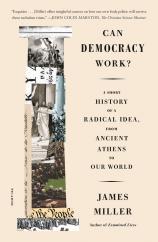Critical Praise
“Democracy has always been at the center of James Miller’s career, whether he was investigating the sublime theories of the Enlightenment or the street politics of the 1960s. Now, at the very moment of democracy’s apparent endangerment, one of its best friends offers up the most capacious and inspiring history of it ever composed. From the Greeks to the present, Miller’s light touch and profound insight join each other on every page to make this a truly indispensable work for the present crisis.”
—Samuel Moyn, author of NOT ENOUGH: Human Rights in an Unequal World
“No one is better qualified to wrestle with the riddle of democracy than James Miller, which is why I have been eagerly awaiting this brilliant and necessary book. CAN DEMOCRACY WORK? is an eloquent, clear-eyed account of democracy’s myriad challenges. This concise and compelling history deserves to be read and debated by all who still dare to dream of a society of equals. These pages left me feeling better prepared and reinvigorated to work toward a more democratic future.”
—Astra Taylor, director of What is Democracy? and author of THE PEOPLE'S PLATFORM
“James Miller, who has illuminated democracy's radical possibilities, now offers some sharp reflections on how those possibilities have fared over the centuries. At a moment when the very meaning of the word is up for grabs, Miller brings us back to philosophical essentials as forged by contingency, contradiction, and human folly. Refreshing and unsettling, here is some political intelligence in a dark and confusing time.”
—Sean Wilentz, author of THE RISE OF AMERICAN DEMOCRACY
“Distinguished historian of ideas James Miller’s short history of democracy and its different meanings is both compulsive and compulsory reading for our sometimes shockingly disenchanted times. Ever optimistic, Miller remains enamored of his native United States’s striking experiment in cosmopolitan self-governance, and stands proudly and persuasively tall for liberal --- and democratic --- ideals.”
—Paul Cartledge, author of DEMOCRACY: A Life
“This sharp, spirited, engaged intellectual history of democracy, including its recent and often loose coupling with liberalism, combines an appraisal of both inherent and situational pitfalls with an appreciation of redemptive possibilities. If democracy is protean, what matters, this rich work teaches, is the quality of our normative choices and institutional imagination.”
—Ira I. Katznelson, author of FEAR ITSELF: The New Deal and the Origins of Our Time



